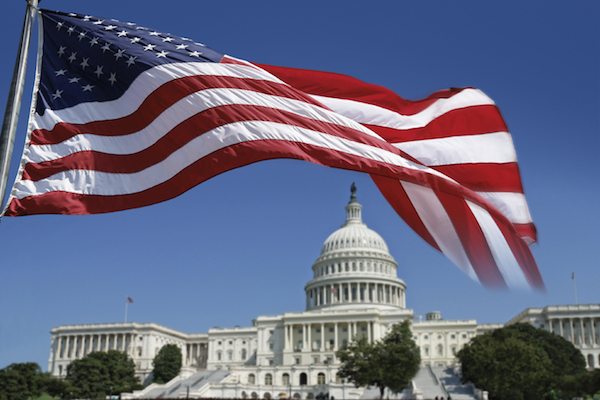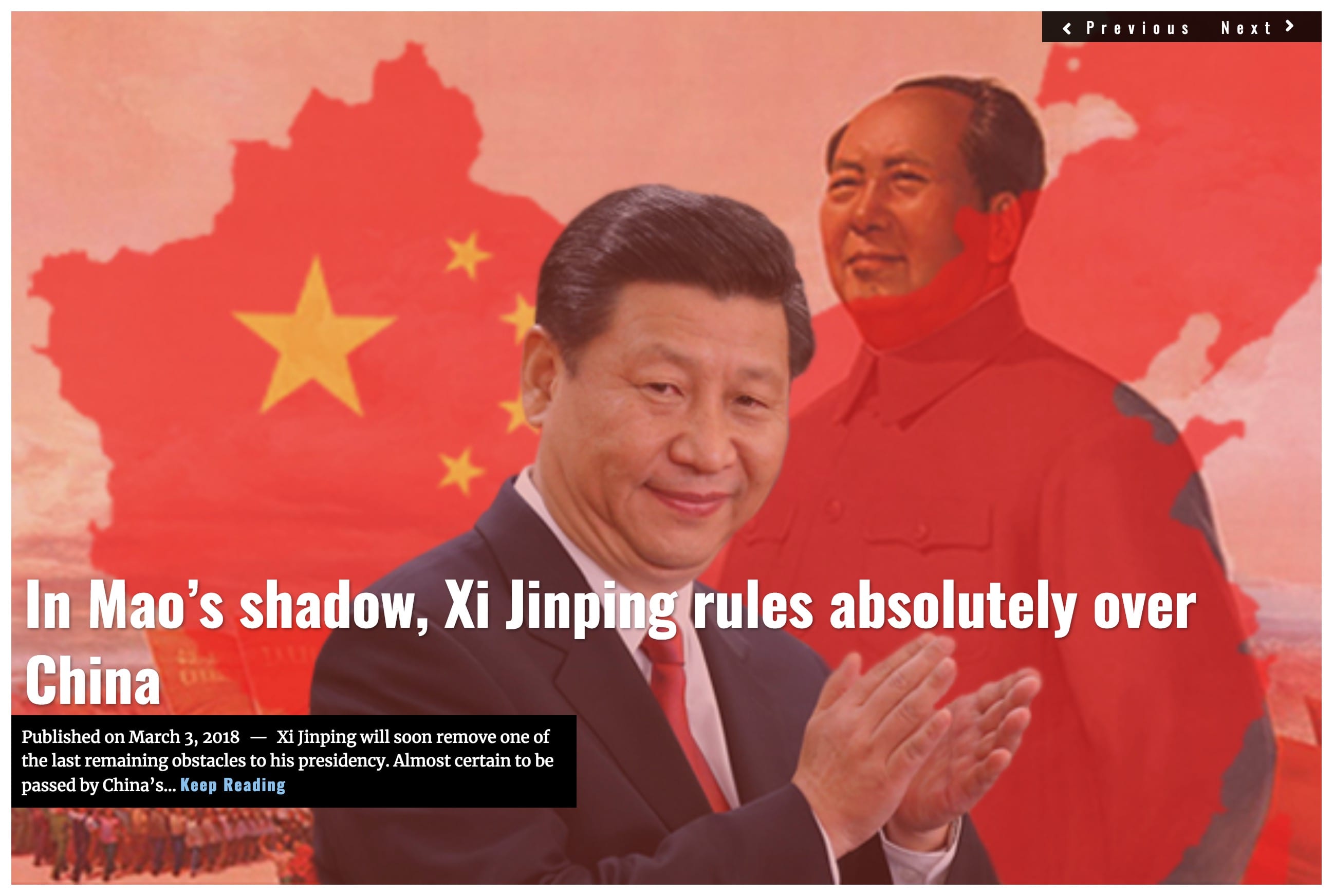Lima Charlie’s Weekly Review: U.S. Politics Edition – Highlights of the week in U.S. domestic, geo, cyber, politics – March 3, 2018.
U.S. Domestic Politics
On Friday, President Donald Trump announced impending tariffs on steel and aluminum, leading many to consider the national and geopolitical consequences of this move. The US is the largest steel importer in the world, bringing in 4 times more than it exports. A brief look into history produces examples of stiff tariffs in the past. Under George W. Bush, a 30% tariff on steel imports was introduced for protectionist purposes, as opposed to the Trump administration’s national security-driven decision. The move did not herald an international trade war at the time and, instead, many obstacles to trade fell, given the short 2-year span of the tariff. On the other hand, potential negative consequences of the decision bring to mind the potential to weaken upwards of 60 years of liberalization of trade in the US. On a global scale, this history contributed to allies of Japan and South Korea developing more advanced economies but, in the immediate present, the move has seen an upset in the US Stock Market and vociferous responses from countries like China looking to defend their own trade interests.
Following the drawing of a new congressional map for the State of Pennsylvania, a gerrymandering lawsuit was brought by a group of Republicans before the Pennsylvania Supreme Court and a panel of three district judges. While the new map complies with the Voting Rights Act, Republicans charge that it tilts several important races in the opposition’s favor for the upcoming midterms.
The debate has gone on since the initial version produced in 2011 was determined to be an unconstitutional gerrymander. The new map, now under scrutiny, was produced on February 19th.
President Trump has suggested the State Republicans appeal to the US Supreme Court but many experts say such a possibility is a long shot
On Friday, Former Secretary of State Condoleezza Rice suggested that sanctions would be the best way forward in punishing Russia for their attempts to meddle in the 2016 Election. Rice also mentioned the administration should be careful of imposing wide-ranging economic sanctions, given the importance of separating the younger generation of Russians from Putin and his close circle of advisors. By Saturday, just one day after unveiling new weapons, including one nuclear-powered cruise missile, the Russian President expressed regret over the disintegration of the Soviet Union in 1991, not a surprise, especially given his 2005 remarks describing it as the “greatest geopolitical catastrophe of the century.” His remarks come just weeks before his March 2018 Presidential Election. During a meeting with the press, he added that if there were one Russian historical event he would like to change, it would be “the collapse of the Soviet Union.”
In one key test of the strength of a Trump endorsement, Joe Arpaio, the former Maricopa County Sheriff whose hard-line immigration responses brought him into the national spotlight, announced his bid for US Senate. The seat will be vacated by his Republican colleague, Jeff Flake. Arpaio successfully sought a pardon in 2017 for criminal contempt for defying a court order to end racial profiling of Latinos. The former Sheriff served no jail time and was pardoned by the President. He now occupies a crowded GOP Senate field alongside Rep. Martha McSally and former state Senator Kelli Ward.
Following a 50-minute phone call with President Trump, Mexican President Enrique Peña Nieto cancelled a planned visit to the US, a move that followed a tense conversation which came to a policy-focused impasse.
In a record-setting 980 days before the next election, US President Donald Trump named Brad Parscale as his 2020 Presidential Campaign Manager, with it, announcing his intention to run for re-election.
US Cyber Politics
Microsoft is currently before the Supreme Court in an attempt to answer the question: can the United States government force US companies to turn over data stored abroad? The case, according to former Justice Department prosecutor Mark Rasch, “raises the largely unresolved issue of where things occur when they happen in cyberspace. We have a real world that has borders and national interests and a virtual world that doesn’t respect them.” The case will set the standard for global scale cross-border data demands.
The Microsoft-Ireland case heard oral arguments this week and the CLOUD Act (Clarifying Lawful Overseas Use of Data Act), which will play a role in the decision, is currently being reviewed for passage by the 115th US Congress. The case is regarding the contents of an MSN.com account that the government suggested was used to conduct drug trafficking, with the data being stored in Dublin, Ireland. Microsoft only handed over information it stored in the US, however.
Worldwide, global players are paying attention to this case, with the EU passing new laws that would compel tech companies to disclose data to governments regardless of where it is stored. On the other hand, lawmakers in Europe argue that Microsoft’s disclosure of the data could violate EU privacy laws and that of other countries.
On Wednesday, Apple’s move to grant China full control of iCloud data had many asking the question, was Apple working against its own interests?
For the first time, Apple will be hosting the encryption keys for iCloud data in China, instead of the US. While the decision is in keeping with recent laws requiring foreign companies to store data locally, it still brings up concerns as the Chinese government no longer needs to filter through the US legal system to retrieve iCloud data. From a global standpoint, however, the move into the Chinese market has always been heralded by Tim Cook. As soon as China was noted as a key market for growth, many were not surprised to see Apple adhering to the Chinese Government’s regulations.
Security Researchers at Kaspersky Lab claim that smart home hubs, devices used to secure all other internet-connected devices within the home, are very vulnerable to cyber-attacks.
According to the Principal Security Researcher at Kaspersky, “The research we’ve conducted on smart home hubs confirms that these connected devices are at risk of an attack – resulting in vulnerabilities across millions of homes. Though it’s no surprise that IoT devices are still proving to be insecure, gadgets that are commonplace in homes, containing personal data, should be afforded the utmost security protection.”
The IoT (Internet of Things) is composed of billions of “smart” devices which utilize wireless technology to communicate with one another and the user—most famously, gadgets like Alexa and Echo. According to a report from the cybersecurity firm Avast, “15,000 hacked internet-connected gadgets would be needed to mine $1,000 of cryptocurrency in four days.” The potential for this seemingly miniscule figure to skyrocket is increased by the sheer number of internet-dependent devices that will exist by 2020.
As published in a recent survey from Gemalto, a global digital security firm, the public’s 96% lack of confidence in the security of Internet of Things (IoT) devices is very likely to result in more strict regulation of the gadgets. According to Gartner, a company which delivers technology research to global technology leaders of business, the Internet of Things is swiftly becoming the “next frontier of technological innovation” but regulation is likely to follow. Gartner projects that in less than 5 years, half of all security budgets will be devoted to fault remediation and safety features instead of detection and protection. Globally, regulatory policy is being drafted in the EU and also in the US, with California leading the charge in its draft of Bill 327 to request connected device manufacturers to install security features during the initial stage of development. In the US, the proposed Internet of Things Cybersecurity Improvement Act of 2017 compels sellers to make sure their devices are reliant on industry standard protocols.
According to a recent February Symantec report, an Iran-based hacking group called Chafer, known for its intranational surveillance, is now shifting its focus outward to the Middle East. The report details attacks on organizations in Turkey, the UAE, Israel, and Saudi Arabia.
The expansion of hacking techniques comes as the group adds novel tools to its rolodex, including the EternalBlue exploit which was a leaked NSA exploit that caused 2017’s NotPetya and WannaCry attacks. There have also been reports of efforts to target an African airline.
A Russian hacker group by the name of Snake—also known by the names Fancy Bear, APT28, and Pawn Storm—is likely behind a worldwide campaign that aimed to initiate a powerful cyber attack on Germany’s government. A spokesman for the German Interior Ministry confirmed the breach. The US government has also laid blame for the Democratic National Committee breach prior to the 2016 Election on this group. Experts say the motive for the attack is likely the promotion of Russian national interests.
President Trump’s 2019 budget proposes to increase federal IT cybersecurity by $1 billion dollars. The Cyber Research division, however, will be moved, marking a budget cut for the Sciences and Technology Directorate.
US Foreign Politics
Lima Charlie presents some recent March 2018 statistics from the Pew Research Center on some of the major generational differences in key foreign policy attitudes in the US:
On Diplomacy vs. Military Strength
A growing share of Millenials believe that good diplomacy—instead of military strength—is the best way to ensure peace. This compares to six-in-ten Gen Xers (59%), half of Boomers (52%) and roughly four-in-ten Silents (43%) who say the same.
On Need For Activeness in World Affairs
The public is evenly divided over whether the US should be active in world affairs, while positive views of US global involvement have increased since 2014.
On Democratic Support for Active US Global Role
The country has seen an increase in such support. Today 47% believe the country should be active in world affairs whereas, three years ago, this figure was only 35%. This can be attributed to the changing tides between Democrats and Democrat-leaning independents.
On Republican Support for Active US Global Role
Among Republicans and Republican leaning-voters, 54% believe the country should pay less attention to problems overseas and concentrate on domestic issues, whereas 39% believe it’s best for the country to be active in world affairs.
On Sunday, following the end to the #2018WinterGames, South Korean President Moon announced that North Korean leader Kim Jong Un would likely be open to talks with the US, according to sources at the presidential Blue House, confirmed via the Korean head of state’s Facebook page. The South Korean leader also announced the country will send a special envoy to the North Korean capital in response to an invitation from the North Korean leader, signifying the most high-profile visit to North Korea since 2007. By Saturday, North Korean officials noted that they would not, however, accept any preconditions for beginning these talks.
The US State Department announced official plans to open its new US Embassy in Jerusalem in May. The opening is set to coincide with Israel’s 70th anniversary. The decision will alter decades of US policy and was accelerated from its original 2019 goal.
On Friday, the State Department announced it would permanently downgrade its embassy in Havana, marking a status of “unaccompanied”. This means that no family members will be permitted to reside there in the wake of attacks on the health of diplomats at the embassy, while the concerns can be sorted out.
On Thursday, Chinese President Xi Jinping moved toward becoming the most powerful ruler in China since Mao Zedong and toward aspirations of China returning to the geopolitical centrality it signified during the imperial period. The country’s Central Committee of the Communist Party moved to lift term limits on the presidency and Xi set himself on the path to eclipsing Zedong, who died in 1976, and essentially becoming a de facto emperor for life. View Lima Charlie’s coverage of this story here.
Geopolitically, the United States remains a force of contention for the Chinese, despite its current debt, but China’s attempts to “Putinize” the country, stripping itself of term limits, may result in the country posing a threat on the international stage in the same manner Russia has done in inserting itself into conflict in Europe, the Middle East, and the US Election. China has not been a market reformer under the current leader, instead shifting the focus to supply-side reform as its umbrella economic policy framework, especially in the arena of steel. Nevertheless, US pushback against the growing Chinese sphere of influence will prove crucial to keeping its escalating power in check on an international scale.
In the wake of record-setting shale oil output, the US is set to outpace both Russia and Saudi Arabia as the globe’s largest producer in 2018. In light of this, Saudi Arabia has found itself reconsidering its global alliances. The US, Russia and China are also reconsidering how they may use this trend change for their own national interests. Washington has proven well disposed to continue a relationship with Saudi Arabia, as a strategic defense against Iran. China looks toward a consistent supply of investment from the Saudis within the scope of its burgeoning petrochemical industries, and Russia seeks energy deals with the nation, overlooking the rivalry both countries have in Syria. All three global powers’ aspirations fall nicely under the Saudi strategy to diversify its current economy that relies primarily on oil.
In the coming month, the US’ top diplomat, Secretary Rex Tillerson, is expected to visit 5 African countries, a move which many see as an opportunity to elucidate the administration’s US-Africa policy. Tillerson will visit N’Djamena, Chad, Djibouti, Addis Ababa, Ethiopia, Nairobi, Kenya, and Abuja, Nigeria according to a statement from the US State Department.
Of particular interest to global markets is the country of Djibouti, one of the smallest nations on the continent. The country has developed into a strategic partner for China, who has utilized the country’s land as a port, a military base, and a free trade zone that is in the works. While more than 500 American firms have offices in South Africa, allowing for strategic and safe business interests to grow on the continent, Djibouti is slowly becoming Beijing’s passageway to Africa.
On Friday, the US State Department announced it would be reaffirming its enduring partnership with Colombia at the bilateral High Level Dialogue in Bogota. The most positive outcome from the meeting was a commitment to expand counter-narcotics cooperation over the next half-decade and to halve cocaine output within this span, tackling illegal narcotics trafficking. Washington and Colombia also expressed a dedication to humanitarian demining efforts and the verification program to ensure land is cleared to global and national standards.
On Saturday, the US participated in the second-ever ministerial-level International Space Exploration Forum in Tokyo. Japan’s Ministry for Education, Culture, Sports, Science, and Technology saw the opportunity as a means for examining how “space exploration expands the horizons of humanity.” One main area of focus was the latest version of the Global Exploration Roadmap. The International Space Exploration Coordination Group released a document outlining an overall strategy for human missions beyond Earth’s orbit. Of note, are robotic missions to the moon scheduled through the 2020’s, Human Mars missions in the 2030’s, and the possibility of humans on the Martian surface by 2035. More than 40 countries participated in the international event.
27 spymasters—heads of intelligence—gathered in Munich for a yearly conference on European security. In particular, CIA Director Mike Pompeo and US Director of National Intelligence Dan Coats attended. This marked a record-breaking number of participants, in addition to 600 other audience members such as the head of British spy service M16 and a member of Britain’s GCHQ. Members of spy services from Rwanda, Iraq, and Europe also attended, allowing conference-goers to delve into discussions on North Korea, nonproliferation, and global diplomacy.
Opportunities for the US to halt Iran’s path to Syria presented themselves last month, as an Iranian drone flew into Israeli airspace, originating from a Syrian base. After being shot down, Israel put forth a series of strikes in retaliation.
As aspirations of Iran’s land-bridge from Tehran to Beirut push forward, opening access to the Mediterranean from Iran, the land mass would commit Lebanon and Syria as possible launching sites for a war against Israel. Since the US had withdrawn troops from Iraq before 2012, the time proved ideal for the Iraqi government to remove barriers to its airspace and allow Iranian aircrafts free passage to reach Syria, establishing not a land-bridge, but an open air pathway.
Global interactions have played a key role in Iran’s ability to manufacture airplanes to pass through this air corridor. While the US’ involvement in this requires the country to tread a fine line, calls have been made for the renegotiation of sanctions against Iran’s civilian aviation to end Tehran’s deals with Boeing and to halt production of Iran Air by stopping Tehran’s deals with, Airbus, Brazil’s Embraer, and Canada’s Bombardier. As has been suggested, US actions could stop these aircraft deals using the Treasury Department’s control over export licenses and in effect closing the air corridor and ending Iran’s prospects of buying Western manufactured airplanes.
US Geopolitics
Geopolitical friction has increased as the US’s success in shale production leaves it poised to pass Russia and Saudi Arabia as the world’s largest producer, upending global markets.
The impact of shale on the global market is particularly displayed as OPEC’s leader met with Houston producers in February. This is the second time in a row the head of the group has met with American rivals. Across the country, monthly crude production reached 10,057 million barrels per day in November of 2017—the largest figure ever recorded in monthly data since 1920, according to a report from the Petroleum Supply Monthly.
The US is now supplying China and India while sharply reducing its imports from Africa. The Saudis find themselves in a position to invest in US shale, simultaneously as America disrupts Russian power over energy in Eastern Europe. At the same time, the US and its allies can counter political strife in Venezuela, Nigeria, and Libya which are large suppliers of OPEC. In the past global diversification and growth would have been negatively impacted by such a disruption in supply.
According to a recent National Interest piece, even the US Navy no longer makes sure goods are safeguarded in the Middle East and South China Sea because its Permian basins “have enough natural oil for America first and foremost.” America is on track to restructure global energy markets worldwide.
As the focus on the South China Sea doesn’t seem to be shifting anytime soon, the battle for the Indian Ocean appears to have picked up. In mid-February, following Indian Prime Minister Narendra Modi’s trip to Oman, an agreement was finalized that will allow India access to the strategic port of Duqm. The port is located on the northwestern edge of the Indian Ocean, providing entry into the Red Sea through the Gulf of Aden.
While India competes with China for influence in the key body of water, it’s important to note that outside of Djibouti, China has no military facilities. However, geopolitically, Beijing could maneuver its way though the Strait of Malacca by organizing facilities in the Ocean itself.
International players like the US, Australia, and the UK are brought into the mix because, amongst them, there is a tightly distributed network of sites which allows for patrolling of the larger coastal area.
The US Navy has a Diego Garcia facility (part of British land), Australia lays claim to the Cocos Islands in the southeastern Indian Ocean, and the western Indian Ocean marks the spot at which US Pacific Command cedes its power to US Central Command, engulfing US land in Djibouti and Bahrain in the fight for control in the Indian Ocean.
A quadrilateral alliance is in formation—though not officially—between Japan, India, the US, and Australia to push back against rising Chinese aspirations in the region.
Global Markets and Politics
Summary on highlights of this week in the interplay between politics and global markets:
The US Dollar reversed gains at the end of the week, following the new aluminum and steel tariffs. While the ICE US Dollar Index was down 0.4% at 89.942, for the week, the index is positive, on track for a 0.1% gain.
Sterling saw an increase following the new policies, although Theresa May’s landmark Brexit Speech on Friday was likely contributory to the fall of the Pound against the Euro, by a figure of 0.38% to 1.1182%.
The Japanese Yen performed very well last week in the foreign exchange market but next week will prove to introduce a significant amount of risk for the currency. Surprisingly enough, the threat comes from outside the country where, in Italy, the upcoming Sunday election is likely to present an obstacle for the Yen. The Italian election also prompts concerns because, if the populist election seekers are able to form a coalition, it would spark debates over whether Italy should remain in the Eurozone. According to Bloomberg, the Yen received a boost on Friday as Bank of Japan Governor Kuroda noted that the central bank would start thinking about how to exit its unprecedented easing around fiscal year 2019. The exchange rate is now 105.48, with the Yen appreciating 1.3% since the end of last week.
On the same day as the Italian election, Germany will eagerly await its own results from its center-left Social Democratic Party’s vote on whether it should join a grand coalition with Chancellor Merkel’s center-right Christian Democratic Union.
US Stocks and Oil
Approaching Friday, the S&P 500 and Dow were on track to close down by about 1%, but they finished the week with 0.6% and 0.4% gains, respectively.
Nasdaq Composite climbed 1.1% to 7,257.87.
US crude oil fell by about 3.6%, while the number of rigs drilling for crude rose by one unit to 800. Natural gas climbed 1.4%.
Shares of steel and aluminum by users such as GM and Boeing fell by 1% and 1.4%. U.S. Steel dropped 1.4% after posting higher gains in the previous session.
LIMA CHARLIE NEWS
[Edited by Nikita Roach]
Lima Charlie provides global news, insight & analysis by military veterans and service members Worldwide.
For up-to-date news, please follow us on twitter at @LimaCharlieNews
In case you missed it:





![A Trump war crime pardon dishonors us all [Lima Charlie News]](https://limacharlienews.com/wp-content/uploads/2019/05/A-Trump-war-crime-pardon-dishonors-us-all-Lima-Charlie-News-480x384.png)


![Image Memorial Day may soon be a remembrance of democracy and those who had the courage to defend it [Lima Charlie News]](https://limacharlienews.com/wp-content/uploads/2018/05/Memorial-Day-may-soon-be-a-remembrance-of-democracy-and-those-who-had-the-courage-to-defend-it-Lima-Charlie-News-480x384.png)
![The Mind of Bolton - AUMF and the New Iran War [Lima Charlie News]](https://limacharlienews.com/wp-content/uploads/2019/05/Inside-the-mind-of-Bolton-Lima-Charlie-News-main-01-480x384.png)

